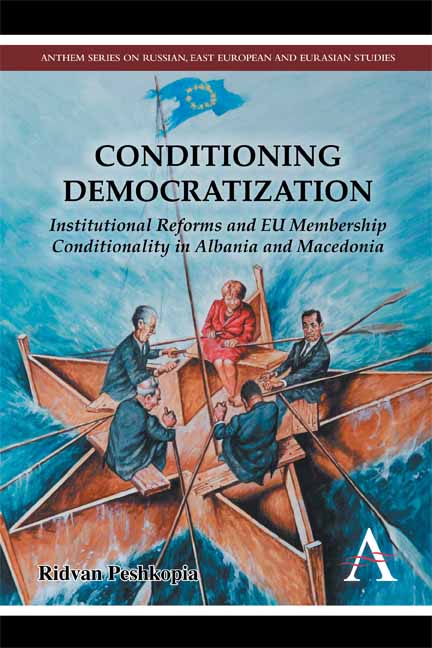Conditioning Democratization
Institutional Reforms and EU Membership Conditionality in Albania and Macedonia
Ridvan Peshkopia
Select Format
Title Details
- ISBN: 9780857283252
- April 2014
- Pages: 352
- Imprint: Anthem Press
How much, and under what conditions, can the European Union affect democratization and democratic consolidation in prospective member states? What mechanisms does the EU employ to influence reforms in countries emerging from authoritarian rule? Focusing on Albania and Macedonia, two postcommunist countries with a legacy of internal conflict, “Conditioning Democratization” analyzes the relationship between EU accession conditionality and institutional reforms. It focuses on four sectors of reform that are often overlooked in other studies: constitutions, asylum, local decentralization and the judiciary system.
The volume critically reviews the theory of “consociational democracy,” often considered the key to stabilizing deeply divided countries, and reapplies it to the supranational institution of the European Union. In articulate, accessible prose, Ridvan Peshkopia builds on examples from multiple sectors in multiple countries to reconceptualize this theory and show that the EU can indeed use membership conditions as a tool to encourage and direct reform.
Ridvan Peshkopia teaches political science at the University for Business and Technology, Kosovo.
Preface; Abbreviations; Chapter 1: Introduction; Chapter 2: A Sectorial Contextual Approach to the Effects of EU Membership Conditionality on Eastern European Institutional Reforms; Chapter 3: Constitutional Reforms in Albania and Macedonia: Conditioning Consociational Practices for EU and Domestic Democratic Stability; Chapter 4: Local Decentralization Reform; Chapter 5: Judicial Reforms; Chapter 6: Asylum Reforms; Chapter 7: Beyond Reforms; Chapter 8: Conclusions; Appendix A: The Demographic Dynamic of Macedonia since 1981; Appendix B: Ohrid Framework Agreement; Appendix C: Analysis of the Fulfillment of the the European Commission’s Recommendations to Albania, November 2010, According to 2011 and 2012 Progress Reports; Appendix D: Geographic and Political Divisions of Historical Macedonia; Notes; References; Index
“This is an engaging, informative and well-structured account which explores some very pertinent and perennial questions. Peshkopia is an EU expert and a Balkans insider.” —Dr Othon Anastasakis, director of South East European Studies at Oxford
Related products
-
International Scientific Relations
Science, Technology and Innovation in the International System of the 21st Century
Francisco Del Canto Viterale
August, 2021
£125.00 / $125.00 -
Up Against the Wall
The Case for Opening the Mexican-American Border
Peter Laufer
foreword by Vicente FoxSeptember, 2020
£34.95 / $34.95 -
The Demographic Dividend and the Power of Youth
Voices from the Global Diplomacy Lab
Edited by Eirliani Abdul Rahman, ElsaMarie D'Silva, Sonja Peteranderl
February, 2021
£125.00 / $125.00 -
Rethinking Pakistan
A 21st Century Perspective
Edited by Bilal Zahoor, Raza Rumi
September, 2020
£125.00 / $125.00 -
Revolution and the Global Struggle for Modernity
Volume 1 - The Atlantic Revolutions
Frank Jacob
March, 2024
£110.00 / $110.00 -
The Ahmadis and the Politics of Religious Exclusion in Pakistan
Ali Usman Qasmi
May, 2014
£115.00 / $115.00







